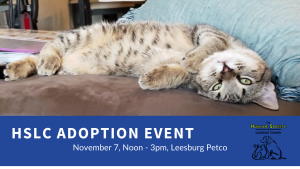
Come meet adoptable cats and kittens! Visit our website for a sneak peek of cats and kittens that are available!
To volunteer and/or bring your foster animals, please click on the following link or copy the link into a new browser window:
Sunday, November 7th Sign-up: CLOSED
The volunteer sign up for events is for current volunteers who have attended our Volunteer Orientation and signed a Volunteer Agreement. Contact HELPANIMALS@HUMANELOUDOUN.ORG for more information
.



CatVideoFest is a compilation reel of the latest and best cat videos culled from countless hours of unique submissions and sourced animations, music videos, and classic internet powerhouses. CatVideoFest is a joyous communal experience, only available in theaters, and raises money for cats in need through partnerships with local animal charities like The Humane Society of Loudoun County.
HSLC will receive 10% of box office proceeds from the noon show at One Loudoun. Get your tickets now before they sell out!
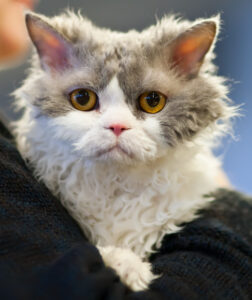
That’s right, there’s a whole month dedicated to the love of our furry feline companions. It is widely believed that cats domesticated themselves by recognizing the abundance and ease of catching prey near human agricultural developments. They essentially chose us, and we are better for it.
Studies have shown that cat owners may experience better mental health than individuals without pets. Cats are great stress reducers. Just 15 to 30 minutes of quality time with a cat can calm your nerves and boost your mood. When you spend time with a cat, your production of serotonin (a chemical that boosts feelings of well-being) goes up, and your cortisol levels (a buildup from stress) go down. Adults and children alike report feeling happier and having more positive feelings if a cat is part of their family. How could you not feel better with a purring ball of fur curled up beside you? And, if you adopt from an animal rescue or shelter, you will feel extra warm and fuzzy that you just saved a precious little life.
If the prospect of warm fuzzies isn’t enough, the Humane Society of Loudoun County has laid out five more reasons cats make great pets.
-
They’re Fairly Self Sufficient
Remember, they chose us. Cats have remained fairly unchanged genetically, meaning they are still capable of living in the wild (but we do discourage allowing domestic cats to roam outside). Cats are still incredibly low maintenance, and very independent, and self-sufficient. Cats also groom themselves, so they don’t need frequent baths. We do, however, recommend they have their teeth and ears cleaned regularly.
-
Small Space, No Problem
Cats are also perfect for apartments or city living. They don’t need a huge backyard or tons of space to play and explore. They are content with nosing their way through the nooks and crannies of your home. As long as you give them plenty to do and have toys available to keep them entertained, cats are happy. A living space and a basic feather toy might be all you need to make playtime a breeze.

Cats can often adapt easily to smaller living environments if you give them a lot of vertical space to move around in, such as cat trees and cat “shelves” that are mounted on the wall.
-
Housebreaking Made Easy
Cats are really good at learning potty training on their own. They like to have their own space and privacy so provide one litter box per cat, plus an additional box, and kitty litter, and they will be happy.
-
Shhhh
Worried that bringing a pet into your home might disrupt things? No worries! Cats are relatively quiet animals; they are almost always in stealth mode. Yes, they’ll meow every now and then, but you don’t have to worry about them barking or even making much noise when they walk.
-
They Bring the Love
The main reason people become pet owners is because of an innate love or affinity for animals. Cats bring tons of love and joy into a household. They are wonderful pets and companions.
If you want to take part in National Cat Lovers Month, please consider adopting through the Humane Society of Loudoun County. There are plenty of cats available for adoption so make sure you take the time to read through all the available information on our website in order to make a fully informed decision. Your future cat companion may be just a click away!
Bonus Way to Celebrate National Cat Lovers Month:
FOSTER
While fostering is still a commitment, it is a more temporary way to help out an animal in need. Your individual attention will give a cat a boost of confidence until it finds its forever home. And if you are interested in fostering, consider fostering a senior cat, a special needs kitty, or an orphan kitten. Follow this link to learn more about fostering through the Humane Society of Loudoun County.
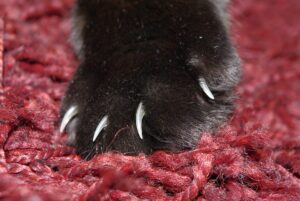
By Heather Nokes (aka Your Neighborhood Vet Assistant)
Scratching and clawing behavior is one of the reasons cats are often rehomed or not adopted. While declawing can seem like a viable solution, this controversial procedure actually creates more problems than it solves.
Why do cats scratch/claw?
- To “sharpen” their nails. Like any other animal, cats’ nails are constantly growing. This means that the outer husk of their nail dies off as the new nail emerges underneath. Often, cats scratch things in order to shed this husk. Not only does scratching “sharpen” the nail, it makes the cat feel better.
- To stretch their muscles. If you have ever witnessed a cat scratching or clawing something, you can attest to the fact that they often stretch out their front legs as far as they can go. Like the downward dog pose in yoga, this opens their body up and feels good.
- To mark their territory. When a cat scratches something, it leaves its scent behind on that object. Other cats can smell this and are warned of their trespassing. This is often comforting to the scratcher, especially the insecure ones, and makes them feel more at home.
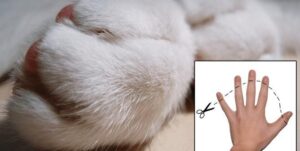
If performed on a human being, declawing would be like cutting off each finger at the last knuckle.
What is declawing?
- The declawing procedure is referred to as an onychectomy. Per Merriam-Webster, this procedure is the “surgical removal of a toenail or fingernail”. However, the surgery itself involves using either a sterile nail trimmer, surgical blade, or laser to literally cut through the bone of the third digit of the toe, which is the bone from which the claw grows.
Why is the procedure so harmful?
- It is very painful. Imagine getting the last digit of your toes or fingers cut off. It would be difficult for you to walk or use your hands and feet for a while after the procedure.
- It can cause complications, diminishing the cat’s quality of life. A cat without claws is unable to defend itself and may become a biter because they no longer have their claws for defense.
- In addition, even when the procedure is done with great precision, it can leave the cat with an altered way of walking which can lead to the development of arthritis.
- For several days after surgery, shredded newspaper is typically used in the litter box to prevent litter from irritating declawed feet. This unfamiliar litter substitute, accompanied by pain when scratching in the box, may lead cats to stop using the litter box.
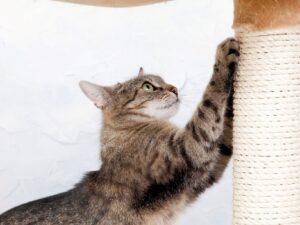
Train your cat to use a scratching post by sprinkling it with cat nip.
What are the alternatives?
- If adopting a young cat or kitten and a scratching problem is noticed, it is important for the owner to train their cat where it is appropriate to scratch, and where it is not. Scratching posts, boards, and furniture are available for sale almost anywhere pet products are sold. Because clawing and scratching is a natural behavior, kittens and young cats that have access to the appropriate scratching tools will use them.
- There are some cats that will just scratch whatever they see first, whether it be a scratching post or your grandmother’s antique chair. There are products that are meant to deter or attract cats from scratching. For example, something as simple as sprinkling cat nip on the scratching post can entice the cat enough for them to scratch there. There is also tape that can be applied to vertical surfaces of furniture. This tape is meant to be safe on furniture but uncomfortable for the cat when they attempt to scratch.
- Nail Caps. Talk to your veterinarian or local pet store employee about nail caps. These are made to fit over your cat’s nails and stay on with glue. Often made of soft plastic, the cat cannot do as much, if any, damage when scratching with them on.
- Frequent Nail Trims. As stated before, cats’ nails are constantly growing. By trimming them every week or two, the cat will not feel the need to scratch as much.
Declawing is illegal in over 40 countries and counting. Several cities in the U.S. have banned declawing. And, last year, New York became the first state to ban the procedure except in rare cases when it is medically necessary. The American Medical Veterinary Association (AMVA) “discourages the declawing (onychectomy) of cats as an elective procedure and supports non-surgical alternatives to the procedure.” HSLC does not condone declawing and will refuse an adoption if the candidate plans to declaw.
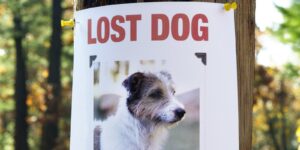
By Madeleine Devost
Each year, over 10 million pets are lost in the United States. However, many are found when the owners take swift and necessary action. Summer can be a particularly scary time for pets who don’t respond well to fireworks and other loud noises or find themselves in strange places due to family travel. For these reasons, July is Lost Pet Prevention Month. I caught up with one of the Humane Society of Loudoun County’s most active volunteers, Jennifer Reed, who shared some useful tips she has picked up from her years of experience getting pets home safe and sound.
In preventing lost pets, owners should make sure to keep their pet safely quartered in the home when there are loud noises nearby such as fireworks, construction, or thunder. These disturbances can send pets into ‘flight mode’ and activate survival tactics that cause them to run for their lives. When this happens, the pet will likely be in a frenzy and not respond to people calling their name.
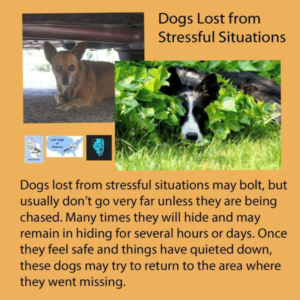 If you lose a beloved pet, Jennifer suggests placing 100+ flyers within a 2-4 mile radius of the missing area as quickly as possible. Flyers should include only the most important and clearest information, especially a line of direct contact (such as a cell phone number). The flyers should lead with “LOST DOG/CAT” in bold and large letters, a recent photo of the pet and employ a simple, uncluttered design. If space allows, add “Do not chase or call out” and “Please report sightings right away”.
If you lose a beloved pet, Jennifer suggests placing 100+ flyers within a 2-4 mile radius of the missing area as quickly as possible. Flyers should include only the most important and clearest information, especially a line of direct contact (such as a cell phone number). The flyers should lead with “LOST DOG/CAT” in bold and large letters, a recent photo of the pet and employ a simple, uncluttered design. If space allows, add “Do not chase or call out” and “Please report sightings right away”.
 Another tool to use are Community Facebook groups where you can relay information about your lost pet and allow members of the community to share it and directly comment with any useful information. Jennifer also recommends reaching out to local shelters and informing them of the missing animal. You can make a report with the Loudon County Animal Services at 703-777-0406 or reach out to local animal tracking groups such as Dogs Finding Dogs or Full Tilt Tracking once the first steps to relocate the pet are taken.
Another tool to use are Community Facebook groups where you can relay information about your lost pet and allow members of the community to share it and directly comment with any useful information. Jennifer also recommends reaching out to local shelters and informing them of the missing animal. You can make a report with the Loudon County Animal Services at 703-777-0406 or reach out to local animal tracking groups such as Dogs Finding Dogs or Full Tilt Tracking once the first steps to relocate the pet are taken.
As you wait for information to come in, create an action plan to implement once your pet is sighted. This plan should include establishing a feeding station and feeding routine to keep the pet in the area spotted so that trapping or catching the animal is possible. Be ready to monitor the feeding station with a surveillance camera like game cameras used by hunters. That way, you will know when and if the pet is still in the area and coming to eat.
Although all of these methods are effective and essential, the absolute best way to find a missing pet is to be ahead of the curve and get it microchipped when you adopt. Microchipping allows your veterinarian’s office to look up your pet’s unique ID number. Jennifer adds that you should also ensure that your personal information in the microchipping database remains up-to-date.
Lastly, if you find a missing pet, please bring it to a vet’s office to see if he/she is microchipped.
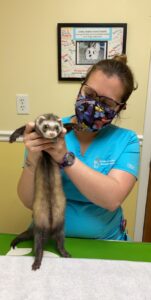
By Heather Nokes
What day is it? Those of us who have been at home for weeks on end are having trouble keeping track. But you know what we are doing? Spending more time with our pets! This means paying more attention to them, their behaviors, and their health. Luckily, veterinary clinics and hospitals are deemed essential businesses. As a seasoned veterinary assistant, this author (see photo) and her colleagues want pet owners to know a few things in this uncertain time.
Our hospitals are just as busy, if not more so, than usual: With people having more free time on their hands, they are able to bring their pet in for routine visits. This is fantastic! However, some veterinary clinics and hospitals are reducing their business hours to protect their staff from exposure. And those hospitals that are running at a normal capacity are filling appointments quickly. It is also important to keep in mind that most of us are doing telemedicine and curbside service which often take up more time than normal office procedures.
We WANT to see your pet… if they are sick: Because of the above listed adjustments, your veterinary hospital may be prioritizing sick visits. This means routine vaccinations and preventative care exams are being put off for weeks or even months.
We act different when you are not around: When we take your pet from you, we understand that it can be nerve-wracking for both you and your fur baby. We take this into account and tend to baby your pet more than you would expect behind closed doors. Not many jobs allow you to use baby talk and cuddles but your veterinary staff is well versed. We do this because we genuinely care for animals and always treat our patients like our very own pets.
At this point, there is no evidence that animals play a significant role in spreading the virus that causes COVID-19: According to the CDC, the risk of animals spreading COVID-19 to people is considered to be low. CDC is working with human and animal health partners to monitor this situation and will continue to provide updates as information becomes available.
Of course, if you have concerns or questions about your pets in this uncertain time, your veterinary hospitals are more than happy to speak with you over the phone. And as always, in an emergency, take your pet to the nearest emergency clinic ASAP!
THIS EVENT IS POSTPONED. WE WILL UPDATE OUR WEBSITE WHEN WE KNOW ARE NOTIFIED OF THE NEW DATE.
FREE EVENT!
Saturday, April 25 Sign-up for Volunteers and Fosters:
Join Claude Moore Park and other local organizations for a celebration of our favorite wild and domestic animals. Discover different animals that are in need of good homes while learning about the wild animals that have one outside!
Since wild animals can’t be pets, staff will help you craft your own “wild” animal to take home.
This event is a place for adoption and wildlife conservation. Currently we are expecting A Forever Home, the Human Society of Loudoun County, BREW (beagle rescue), Pet Connect & Rescue, and the Nirvana Ridge Ferret Rescue will be here. There will be animals here to view and adopt. NO VENDORS will be present.
